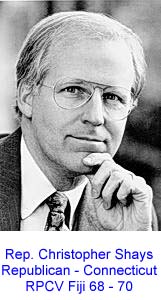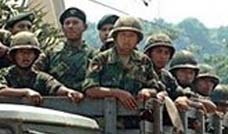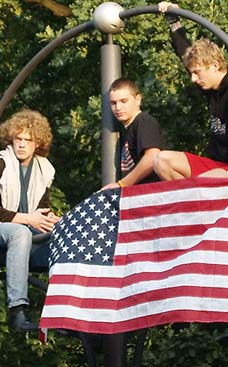
"Iran’s nuclear ambitions are of grave concern to countries in the Middle East, particularly Israel. It is likely, if the international community does not take action to prevent Iran from acquiring nuclear weapons, Israel will act unilaterally. As I recommended following my trip to Iraq in August 2006, we need a timeline for the withdrawal of US forces. Most of our troops should be out of Iraq by December 2009, but a small US presence is still required to bolster the Iraq Security Force by offering medical, logistical, transportation and training support; acting as a deterrent from external attack; and providing stability so the Iraq military will not exert undue influence over the elected government. Pakistan is in serious trouble, and unless the international community provides economic and security assistance the democratically elected government could collapse, with a nuclear Pakistan becoming an even greater haven for terrorists. It is essential we understand our objective in Afghanistan, what is required to reach it, and whether the objective is possible. Before the United States commits additional forces, we must know what their impact will be; ask other NATO member states to contribute more forces; and request all combat restrictions be lifted. While I believe Iraq is improving, I am concerned about the turmoil in Pakistan, the violence in Afghanistan, and the nuclear threat posed by Iran." Congressman Chris Shays of Connecticut served as a Peace Corps Volunteer in Fiji in the 1960's.
Shays Outlines Observations on 21st Trip to Iraq and on Israel, Afghanistan and Pakistan
The Honorable Robert M. Gates
Secretary of Defense
1000 Defense Pentagon Room 3E880
Washington, DC 20301-1000
Dear Mr. Secretary:
I recently traveled with Congressional Delegation Marshall to Israel, Iraq, Pakistan and Afghanistan where we met with key officials.[1] The purpose of the trip was to continue oversight of security and political developments in these countries and to make specific recommendations concerning the direction of US policy.
The countries we visited have considerable security, political and economic problems which ultimately affect our national security interests. Israel is extremely concerned about Iran’s nuclear ambitions. An Israeli-Palestinian peace agreement continues to be elusive.
While security in Iraq has improved dramatically, there is still the possibility al Qaeda could regenerate, and there is always the chance civil strife could reemerge. The political and economic challenges in Iraq will require prolonged attention from both the United States and the international community.
Pakistan is in turmoil, and its Western and Northern areas are havens for al Qaeda and the Taliban. Increased violence in Afghanistan and corrupt government officials compound that country’s difficulties.
We must be both realistic and objective in considering our future policies for the Middle East, Afghanistan and Pakistan.
The following observations and recommendations are based on my trip and are provided for your consideration:
ISRAEL
Observation: Iran’s nuclear ambitions are of grave concern to the international community, especially countries in the Middle East, particularly Israel. If Iran is able to acquire nuclear weapons, other countries in the region, such as Egypt and Saudi Arabia, will definitely do the same.
Recommendation: The United States needs to develop contingency plans on how we deal with Iran if it acquires nuclear weapons.
Recommendation: While I do not advocate military action against Iran, the United States must carefully weigh whether to take such action against Iran’s nuclear facilities.
Recommendation: The United States should prepare contingency plans to respond to the consequences of an attack by the United States on Iran’s nuclear facilities.
Observation: Israel believes Iran may acquire nuclear weapons within 18 months, and counsels the international community to act now to prevent this from happening. It is likely, if the international community does not take action to prevent Iran from acquiring nuclear weapons, Israel will act unilaterally.
Recommendation: The United States should prepare contingency plans to respond to the consequences of an attack by Israel on Iran’s nuclear facilities.
Observation: The Iranian regime denies Israel's right to exist and speaks openly of annihilating the Jewish state. Iran, working with Syria, is the principal sponsor of the terrorist organizations Hezbollah and Hamas.
Recommendation: It is imperative the United States work with Israel to break the link between Syria and Iran and encourage the Israeli government to resolve its differences with Syria on the Golan Heights.
Observation: A peace agreement between the Israelis and Palestinians is elusive. Israel cannot accept Palestinian demands on key issues involving a divided Jerusalem, the right of return of Palestinian refugees, reestablishment of the 1967 borders, or abandonment of all Israeli settlements.
Additionally, the Palestinians have a weak and divided government. Hamas controls Gaza, and the Palestinian Authority is practically powerless in the West Bank. The small size of these two territories and the fact they are not contiguous put in question whether a new Palestinian State can be economically viable. Even if an agreement is reached within the next few years there will be continued pressure for Palestinians to expand their territory.
The road map for peace proposed by the Quartet (the European Union, United States, Russia and United Nations), calling for an independent Palestinian State living side-by-side with Israel, may not represent the best alternative for any of the parties.
Recommendation: Two alternative plans should be considered.
Alternative I: Twenty years ago Prime Minister Shimon Peres offered King Hussein of Jordan the opportunity to take over the West Bank. The West Bank would become a federation with Jordan assuming security responsibility.
Alternative II: General Giora Eiland, former head of Israel’s National Security Council, proposes a regional approach involving Egypt, Jordan, Gaza and the West Bank. This plan allows Israel to keep many of its settlements, but cedes some of its territory to Egypt in exchange for Egypt ceding some of its territory to Gaza. To stimulate trade between the territories, a corridor would be built through Egypt and Israel connecting Gaza to Jordan, giving Jordan access to the Mediterranean.
IRAQ
Observation: Security has improved dramatically in Iraq. On the first day we were there, only 14 security incidents, including criminal activity, were reported throughout the country. One reason for the improvement is the increased capability of Iraq Security Forces as demonstrated by their successful operations in Basra and Sadr City.
Recently, some 3 million visitors from Iraq and its neighbors made the annual pilgrimage to Karbala to observe the birth of Imam al-Mahdi, the 12th Imam revered by Shiites. Over 40,000 Iraq Security Forces successfully protected all the pilgrims. In previous years, these pilgrimages have been marred by numerous attacks but this year there were no reported incidents.
Recommendation: We must stay focused and continue the forward momentum. Hunting down al Qaeda, neutralizing insurgents, training Iraq Security Forces, and protecting Iraq citizens must remain our highest priorities.
Recommendation: As I recommended following my trip to Iraq in August 2006, we need a timeline for the withdrawal of most US forces. The progress in Iraq enables us to reduce our forces in a safe and responsible manner by approximately 5,000 troops per month, until we reach a level of 50,000 to 60,000 troops by the end of 2009. A timeline will motivate the Iraq Government to stay on course and/or make even greater efforts to stabilize its country. [2]
Observation: Currently Iraq Security Forces are focused on fighting insurgents and terrorists. In the future, they will need tanks and artillery to build a credible force capable of defending their country from foreign forces.
Recommendation: While reducing our troop levels, we need to continue training Iraq Security Forces and help them build their medical, logistical and transportation capabilities.
Recommendation: We must also begin training some of the Iraq forces for a traditional military role, defending their nation from external attack.
Observation: Most of the militias in Sadr City have been neutralized. The city has been divided into three zones -- one controlled by US forces, another controlled by Iraq Security Forces, and a third which continues to have some militia presence. Civilian leaders in Sadr City on the District Advisory Council argue they need more security forces deployed throughout the city.
Recommendation: We should encourage the Iraq Government to deploy additional forces to Sadr City to ensure all areas have the same high-level of security.
Observation: The District Advisory Council members also explained the need for improved essential services, sewage, water and electrical power.
Recommendation: The Iraq Government should provide more financial assistance to rebuild Sadr City and work harder to provide essential services to its citizens.
Recommendation: With the dramatic improvement in security we should also encourage non-government organizations to expand their work in Sadr City, helping to improve services and assist in building civil society.
Observation: Iraq is awash with money, with oil revenues expected to reach $70 billion in 2008. It is eager to purchase billions of dollars of civilian and military goods. Many countries are taking the initiative to sell products to Iraq, especially military equipment.
While American businesses are in Iraq, they are employed as US Government contractors. Few US companies are offering their goods or services to the Iraq Government. The fact is US corporations are sitting on the sidelines, allowing businesses from Europe, Russia and Asia to fill the void.
If Iraq buys US products, especially military hardware, it reinforces an important and positive relationship between our two countries.
Recommendation: American businesses should actively seek to sell their goods and services to Iraq and we should help them make inroads into this market. Further, American businesses should invest in Iraq.
Recommendation: I renew my recommendation to increase funding for the Department of Defense Office of Business Transformation. This office along with the US Embassy in Baghdad should encourage US businesses to compete in Iraq.
Recommendation: I also renew my recommendation that any future Iraq reconstruction initiatives and payments for its security, health and welfare come from Iraqi revenues. If the Iraq Government cannot properly allocate and spend its revenues then its own revenues should be transferred to the United States to take on this task.
Observation: Iraq political leaders—Shia, Sunni and Kurds—are more confident. Neutralizing the militias in Basra and Sadr City was not only a military victory but a political milestone. These actions demonstrated Shia Prime Minister Nouri al-Maliki’s willingness to confront Shia militia and highlight his efforts to reconcile differences among the groups. After these actions, Sunni elected and appointed officials have ended their boycott and have begun to participate in the government again.
Recommendation: We should applaud the success of Iraqi leadership and give them credit for their accomplishments. In addition, we should make clear to all Iraqis we appreciate their successes as well as their gratitude for our efforts.
Observation: When I first recommended in June 2007 that we conclude a Status of Forces Agreement (SOFA) with a sovereign Iraq Government, I believed it would be beneficial for Iraq and the United States.
The difficult negotiations between countries concerning the status of US forces is additional proof Iraqi leaders are becoming more confident. They believe their security gains are sustainable, durable and irreversible, and that they will be able to handle their own security needs sooner rather than later.
Recommendation: I renew my recommendation that the Status of Forces Agreement with a sovereign Iraq be concluded as quickly as possible.
PAKISTAN
Observation: The Government of Pakistan is not just fighting the Taliban insurgency, coping with a judicial crisis, or dealing with a fractured coalition. It is also trying to manage its economy during one of the worst periods in the country’s history.
Recommendation: The United States and the international community must provide Pakistan additional financial assistance during this economic crisis, provided we can properly account for every penny spent.
Recommendation: Congress should pass legislation authorizing funding for Reconstruction Opportunity Zones in Afghanistan and Pakistan which will help bring economic opportunity and prosperity to those regions where the population is at risk for recruitment by the Taliban and al Qaeda.
Observation: Pakistan is one of the most unstable and dangerous countries in the world because its government is weak, it possesses nuclear weapons, and it has not successfully neutralized the Taliban and al Qaeda forces operating along its border with Afghanistan in the Federally Administered Tribal Areas (FATA) and the North West Frontier Province (NWFP).
Recommendation: Both the United States and the international community must provide additional funds and personnel to train Pakistan’s Frontier Corps engaged against the Taliban and al Qaeda. We must also provide the Pakistani military equipment such as helicopters, night sights and night vision goggles, but we must ensure these sensitive items are closely monitored.
Observation: The military is powerful and has been a dominant force throughout Pakistan’s history. Its main focus has been directed at its neighbor, India, and therefore does not provide the necessary resources to confront the Taliban and al Qaeda within its borders.
Recommendation: The international community should help Pakistan and India conclude a lasting peace agreement to end the confrontation, and to allow for a more effective deployment of Pakistan’s military resources.
Recommendation: Pakistan must gain control over its lawless tribal areas. We must make it clear to Pakistan that if it is not more aggressive in stemming cross-border activity by the Taliban and al Qaeda into Afghanistan, US funding may be cut off.
AFGHANISTAN
Observation: Afghanistan is a country that has never experienced the industrial age. Seventy percent of its people cannot read or write. It is a large country, almost the size of Texas, with 31 million people and not much infrastructure.
No nation has ever conquered Afghanistan. Even Alexander the Great, while winning a major battle, never subdued its citizens completely.
Afghanistan is home not only to several religious sects but also to a host of different ethnic, linguistic and tribal groups. Rivalry and even armed hostilities have traditionally been common among these groups. The tribes of Afghanistan come together only when there is an external threat. Historic and geographic factors have led to the creation and preservation of a divided and diverse Afghanistan.
Recommendation: We must not make the same mistake we did in Iraq by not understanding the history or culture of Afghanistan.
Recommendation: We must not make the same mistakes as Britain and the former Soviet Union by being viewed as occupiers.
Recommendation: We should consider encouraging President Hamad Karzai to begin reconciliation efforts among all the tribes by calling their leaders together to discuss and help resolve the issues dividing them.
Observation: The primary reason the international community is in Afghanistan is to insure it will not be used again as a safe haven to support terrorists.
Recommendation: There should be no misunderstanding. Our goal in Afghanistan is the prevention of Islamic extremists reestablishing themselves and again using it as a base to attack the United States or other nations. The best way to attain this goal is to help Afghanistan establish a stable democratic government that prospers economically. It remains to be seen if this is possible.
Observation: When the Taliban was ousted from Afghanistan in late 2001, the country was in shambles. Decades of war and conflict stripped it of even the most basic infrastructure and services. With the assistance of the international community, some Afghanistan provinces are developing but others still lag behind.
Recommendation: We must not allow the faster developing provinces to slip back into their previous security and economic predicaments. Any slippage of security or development should be quickly shored up with a rapid reaction force of military and economic development personnel.
Observation: Corrupt government officials and failure to confront the opium trade have enriched and empowered the Taliban and al Qaeda and compromised all levels of the Afghanistan Government.
Recommendation: We should do everything we can to encourage President Hamad Karzai to do more to confront corruption and the expanded opium trade.
Observation: The United States has made progress training and deploying Afghanistan National Security Forces. However we are making the same mistake we made in Iraq: we are not training nearly enough indigenous forces to properly secure the country.
The actual level of Afghanistan National Security Forces is approximately 143,000 (65,000 Army and 78,000 Police). This is pathetically low.
The current goal for Afghanistan National Security Forces is approximately 200,000 (Army 120,000 and Police 80,000). This level is clearly insufficient to defeat the insurgents and terrorists and establish a stable independent nation.
Experts have testified at Congressional hearings that successful counterinsurgencies have historically required 20 security personnel per 1,000 of population, which, in the case of Afghanistan’s 31 million people would be 620,000 security personnel.
Recommendation: The size of the Afghanistan National Security Forces must increase dramatically. If this is not possible, we need to rethink our entire effort in Afghanistan because the only alternative would be to have a very large number of foreign forces securing the country. This is clearly unwise.
Observation: The United States supplies over half of all the foreign military forces in Afghanistan. The International Security Assistance Force Commander is requesting additional US military.
Recommendation: Before the United States commits one additional military service member to Afghanistan, we must have a clear sense of what their impact will be on the overall mission.
Recommendation: Before the United States commits additional forces to Afghanistan, we must ask other NATO member states to contribute more forces, and request all combat restrictions be lifted.
CONCLUSION
Iraq - I believe we are on the right track. General Petraeus and Ambassador Crocker, and the men and women who serve with them, have done a truly magnificent job. The American people, despite their reservations, continue to be supportive of our military’s efforts. We are at a point where the Iraqi people and their government can begin to finish the job by securing their own country and investing in their own economic prosperity.
Even with improving conditions, Iraq will continue to have weaknesses. A small US presence is still required to bolster the Iraq Security Force by offering medical, logistical, transportation and training support; acting as a deterrent from external attack; and providing stability so the Iraq military will not exert undue influence over the elected government.
Pakistan - Pakistan is in serious trouble, and unless the international community provides economic and security assistance the democratically elected government could collapse, with Pakistan becoming an even greater haven for terrorists. Afghanistan and Pakistan are inextricably linked. Pakistan insurgent and terrorist cross-border activity makes it difficult for Afghans to secure their country and make strides in economic development.
The terrorist threat emanating from Pakistan and Afghanistan is a threat to the entire world. The United States has done a disproportionate share of heavy lifting. NATO must do more, both militarily and economically, to help this region.
Afghanistan - Afghanistan represents a unique problem. Our efforts there are often characterized as the “Good War” and the main front on terrorism. We should question this description. There is very little good about this war.
Afghanistan is a country that exists in name only, and the United States and its NATO allies are in danger of being perceived as the latest occupier. If occupation becomes a perceived fact, we will fare no better than the former Soviet Union, and will ultimately be forced to leave.
It is essential we understand our end objective in Afghanistan, what is required to reach it, and whether the objective is actually possible.
It would be unwise for the United States to deploy additional troops to Afghanistan unless we are convinced it could lead to success. It would also be unwise to deploy additional troops without a commitment from other NATO members to match our number and let them be utilized in a combat role.
As always, I welcome the opportunity to discuss these matters with you more fully. If you have any questions or would like additional information on these observations and recommendations, please contact me at (202) 225-5541 or Dr. R. Nicholas Palarino, Senior Investigator and Policy Advisor, at (202) 225-5074, who accompanies me on these trips.
Sincerely,
Christopher Shays
Member of Congress












